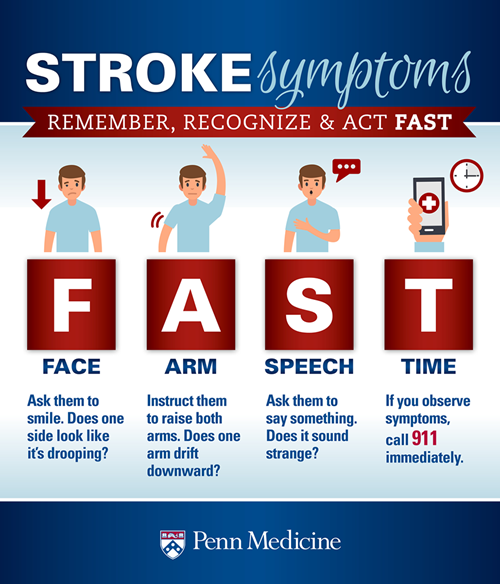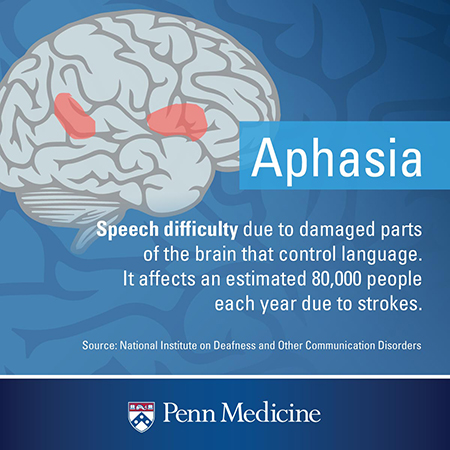what to do if you think you had a mini stroke
When a person is having a stroke, every second counts. And what y'all practice in those critical moments tin potentially help save someone'south life.
Kelley A. Humbert, Physician, Assistant Professor of Clinical Neurology at Penn Medicine, spells out important practise'south and don'ts, so you can exist ready to give your loved one the best risk of surviving a stroke.
A stroke is oft described every bit a "brain attack." Part of the brain is robbed of the oxygen and blood supply it needs to function, because a blood vessel to part of the brain either has a jell or blockage, or bursts.
The longer a stroke goes untreated, the more brain cells die. But there are treatments that can be given if a person reaches the infirmary in time.
Three Things to Do When Someone Is Having a Stroke
i. Phone call 911 immediately
If y'all exercise nothing else, human action chop-chop to call 911.
"The hardest thing you have to do is recognize symptoms of a stroke," Dr. Humbert explains. "If yous practice notice any symptoms, you lot should call 911 immediately. You should also immediately tell the 911 dispatcher, 'I call back I'm having a stroke' or 'I think my loved i is.'"
Not sure what the symptoms of a stroke are? Give someone y'all call back is having a stroke this FAST test from the National Stroke Association.

2. Note the fourth dimension yous first see symptoms
A clot-busting medication called tPA, or tissue plasminogen activator, can be given to someone if they're having a stroke, potentially reversing or stopping symptoms from developing. Merely it has to be given inside 4.5 hours of the start of symptoms, Dr. Humbert says.
Patients may besides be candidates for more advanced therapies, such as endovascular treatments, at Penn Medicine. Endovascular treatments can involve surgically removing a clot that caused a stroke, or fixing an aneurysm — which is a bloated blood vessel that bursts and causes haemorrhage and pressure level build-up in the encephalon. Endovascular treatments for ischemic stroke, which are strokes related to blood clots or blockages and are the most common type of stroke, must exist administered inside 24 hours of symptom onset, and earlier treatment improves outcomes so fourth dimension is critically important.
"If a witness sees someone develop symptoms of a stroke, the first pace is always to phone call 911. But closely later this, information technology would be helpful if they look at what time the symptoms started; or if the person was found already with stroke symptoms, it is helpful to attempt to effigy out the last time you or someone else saw that person without any symptoms and as their normal self," she says. "That way, the emergency staff can make a more informed determination about handling options and ensure these are equally condom as possible."
3. Perform CPR, if necessary
Most stroke patients don't require CPR, Dr. Humbert notes. Merely if your friend or spouse is unconscious when y'all detect them, cheque their pulse and breathing. If you detect none, call 911 and start CPR while you're waiting for the ambulance to arrive.
You can as well enquire the 911 dispatcher to walk you through how to perform CPR if yous don't know or are uncertain, which consists of repeated, steady chest compressions, according to the American Heart Association.
Three Things Not to Practise When Someone Is Having a Stroke
one. Practise not let that person get to sleep or talk y'all out of calling 911
Stroke survivors oft complain of suddenly feeling very sleepy when a stroke kickoff happens.
"A lot of patients come in and say they went to sleep for a few hours before they came to the hospital because they were tired," Dr. Humbert notes.
Merely time is of the essence. "The medication and whatever surgical treatments we tin give a stroke survivor are incredibly time-sensitive," she adds. "They should not become to sleep, and they should not telephone call their primary care doctor commencement. Instead, they should but go immediately to the emergency room."
And no matter how much someone might try to talk you out of taking them to the hospital, don't let them, says Dr. Humbert.
2. Do not give them medication, food, or drinks
There are two kinds of strokes:
- Hemorrhagic stroke, caused past a ruptured blood vessel leading to brain bleeds
- Ischemic stroke, acquired by a clot leading to blockage in a blood vessel
"lxxx percent of strokes are ischemic ones, merely if you're in that 20 per centum and your stroke was caused by a ruptured blood vessel in the head, you don't want to take aspirin," Dr. Humbert says. "And you tin can't tell which one it is until you lot get to the emergency room and y'all get a CAT scan." Aspirin actually might hurt your loved ane more, and cause more bleeding if in fact they are having a hemorrhagic stroke, because aspirin is a claret thinner.
To be safe, don't requite someone who has stroke symptoms whatever medication.
You also shouldn't give them food or drinks before the ambulance comes. "Sometimes, a stroke affects their ability to swallow," Dr. Humbert says. This could ultimately crusade more harm to the person if they asphyxiate and develop infections or trouble animate.
3. Do not drive yourself or someone else to the emergency room
It might seem like a good idea to drive a stroke victim to the nearest emergency room. But Dr. Humbert says, "If someone is severely affected past a stroke, so you're better off calling 911."
Emergency responders can start life-saving treatment for that person on the way to the emergency room, the Centers for Illness Command and Prevention (CDC) says. Additionally, emergency responders will ensure the person is taken to a hospital that has the medications and treatments available to treat stroke patients immediately if that is what is going on, every bit not all hospitals are equipped to handle stroke patients.
You also don't want to bulldoze yourself to a hospital in the issue that your stroke symptoms worsen and impair your ability to drive safely.
Stay Focused and Take Action Chop-chop
As frightening as it can be to witness someone having a stroke, taking a few key steps — and fugitive others — can potentially help your loved one have the best possible outcome. "We have a process in place to treat someone who is having a stroke critically once they get here," Dr. Humbert notes. "But they really demand to get here as quickly as they tin."
The Symptoms That Could Mean You're Having a Stroke
The symptoms of a stroke can vary from patient to patient. Only they tend to have one affair in mutual: They have people by surprise, says Dr. Humbert.
"Stroke symptoms come on very suddenly," she says. "People are fine one moment and so suddenly take symptoms, such every bit weakness, numbness, trouble talking, or loss of vision. They might wonder where information technology came from."
What's happening? A stroke occurs when the blood's menstruum to the brain is impaired, either because blood flow is blocked (ischemic stroke), or a blood vessel in the brain ruptures leading to leakage and bleeding (hemorrhagic stroke).
Without normal blood flow, brain cells first to dice, and the functions controlled by that area of the brain — such as speech communication or muscle movement or vision — are impaired or lost, the National Stroke Association says.
The furnishings can cause permanent brain impairment and disability, depending on how severe the stroke was and how speedily the patient is able to get help.
What Does a Stroke Feel Like?
Strokes can carry a number of sudden, telltale symptoms, Dr. Humbert says. These include:
- A droop on ane side of the face up
- Difficulty lifting 1 arm to its full height or using one paw
- Difficulty moving ane leg, or dragging a leg while trying to walk
- Slurred speech communication or difficulty with talking
- Impaired vision in 1 or both eyes
- Vertigo or dizziness
- Difficulty walking or sudden imbalance
The American Heart Association/American Stroke Association notes that a sudden severe headache that does not appear to be triggered by anything is another potential sign that you might be having a stroke. Quite frequently, though, strokes are painless, which can surprise people, Dr. Humbert says.
"Although some strokes are associated with a headache, many occur without any accompanying pain," she says. "This doesn't mean you're non having a stroke. If yous're having symptoms of a stroke, you lot need to get medical care immediately."

Even If Symptoms Vanish Quickly, Call for Help
Y'all should too be enlightened that warning signs might last simply for a few minutes before they disappear. These brief episodes are transient ischemic attacks (TIA), sometimes called "mini-strokes." They however should be taken seriously, because they tend to exist signs of underlying serious weather that can lead to a full stroke, fifty-fifty perchance in the few days following a TIA event if not evaluated and treated for a TIA.
"Information technology's not uncommon for people who take had a TIA to ignore it because the symptoms went away and they don't know what it was," Dr. Humbert says. "Just people who have TIA symptoms are definitely at higher risk of having a subsequent stroke, and they need to be evaluated urgently."
Call 911 Immediately
Once you recognize that you or someone you witness is having a stroke, the next step is calling 911 chop-chop, Dr. Humbert stresses.
Fourth dimension is critical if someone is having a stroke. The longer a stroke goes untreated, the more damage tin can be done — possibly permanently — to the brain.
"If you doubtable you or someone you're with is having a stroke, don't hesitate to call 911," Dr. Humbert says. "Information technology could save a life."
The Penn Stroke Centre is a Joint Commission-certified Comprehensive Stroke Center. Patients who have suffered a stroke have access to the nearly advanced resource bachelor for the handling of stroke 24 hours a twenty-four hours, seven days a week, 365 days a year.
Learn More than About the Penn Stroke Middle
Source: https://www.pennmedicine.org/updates/blogs/neuroscience-blog/2022/march/what-to-do-if-someone-is-having-a-stroke
0 Response to "what to do if you think you had a mini stroke"
Post a Comment